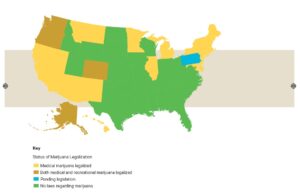Mapping the U.S. states that have legalized marijuana is not an easy task.
Each time an election cycle rolls around, the map seems to change, bringing with it an increasing proportion of the country where marijuana usage, both medicinal and recreational, is legal under state laws, at least to some degree.
Employers are becoming increasingly more concerned about how the shift will affect their operations, and along with it experts have started advising them of ways to help ensure they achieve their top priority — a safe and productive workplace.
It often comes down to an employer feeling stuck between a rock and a hard place that involves deciding between tightening drug policies to exclude marijuana users from their workforce and loosening drug policies to avoid cutting out qualified employees.
In a paper prepared by partners at Assurex Global, Paul Bittner, a partner and vice chair of the Labor and Employment Group for the law firm Ice Miller, cites a story involving a client in Southeast Ohio. The client had to consider dumping its pre-employment drug screening requirement because it was losing too many prospective employees with the turn up of THC, the psychoactive chemical in marijuana, in their tests.
“That’s disturbing from an employer’s perspective,” says Bittner. “You don’t want people coming to work under the influence of a drug. You not only lose productivity, but the bigger concern for employers is potential liability if there’s an accident and someone gets hurt or killed.”
 But that scenario is not expected to become less likely any time soon.
But that scenario is not expected to become less likely any time soon.
Colorado, Washington, Oregon, Alaska and D.C. have already passed laws legalizing both recreational and medical marijuana, while an additional 20 states have legalized some form of medical marijuana.
Another handful of states either have legislation pending or have groups preparing ballot initiatives.
For employers, legalization raises a number of concerns:
- It could affect current drug policy.
- It may impact safety of employees, suppliers and customers.
- It could affect hiring procedures.
- It could affect standing with the federal government.
- It could have an effect on insurance.
Regardless of individual effects on different aspects of business, Bittner recommends that employers put safety first. In other words, if your company has an existing drug-free work policy, keep it that way.
“Marijuana remains illegal under federal law,” says Bittner. “If employees choose to use and test positive, then they will suffer the consequences of your drug policy.”
Bittner cites Coats v. Dish Network, a 2015 case out of the Colorado Supreme Court that ruled that an employer is legally allowed to fire an employee for using marijuana during off-work hours.
Colorado had an existing statute that protects employees from any adverse actions by their employer as long as they are participating in “lawful activities” while off duty, but the ruling held that “lawful activities” refers to any activity that is considered lawful under state and federal regulations, and marijuana remains illegal under federal law.
Though cases will involve varying circumstances, Bittner says Coats v. Dish Network should be used as the “go-to” when grappling with the decision to uphold company drug-free policies.
Bittner says there are several tips employers can use as best practices when it comes to policies overall, including:
- Make offers for employment conditional on successfully passing a drug test, but keep in mind you can only make this a condition for employment if all new employees in the same job are required to take the test.
- Ensure that your state allows “for cause” testing of an employee if you have reasonable suspicion that an employee is impaired.
- Be mindful when implementing and designing a random drug test policy. If an employee feels that he or she has been singled out too much, it could lead to a discrimination claim.
- Be aware that if you give too much advance notice to employees about pending drug tests, they may be able to evade detection depending on the test used.
- Develop a specific policy involving medical marijuana users. If you are federally funded or have federal contracts, the policy must be in compliance with the Drug-Free Workplace Act of 1988. If not, the policy must still meet the standards of state law.
- Adhere to your state’s off-duty conduct laws: Statues that protect employees from adverse employment actions based on their off-duty activities can be found in 29 states and in D.C.













